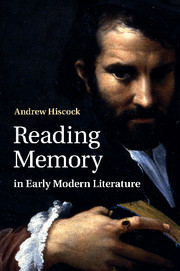Book contents
- Frontmatter
- Contents
- Figures
- Acknowledgements
- Introduction: ‘the dark backward and abysm of time’
- Chapter 1 ‘To seke the place where I my self hadd lost’: acts of memory in the poetry of Henry Howard, Earl of Surrey
- Chapter 2 ‘Remembre not (lorde) myne offences’: Katherine Parr and the politics of recollection
- Chapter 3 ‘Better a few things well pondered, than to trouble the memory with too much’: troubling memory and martyr in Foxe’s Acts and Monuments
- Chapter 4 Text, recollection and Elizabethan Fiction: Nashe, Deloney, Gascoigne
- Chapter 5 The Doleful Clorinda? Mary Sidney, Countess of Pembroke, and the vocation of memory
- Chapter 6 ‘Tell me where all past yeares are’: John Donne and the obligations of memory
- Chapter 7 ‘Of all the powers of the mind … the most delicate and fraile’: the poetry of Ben Jonson and the renewal of memory
- Chapter 8 ‘This art of memory’: Francis Bacon, memory and the discourses of power
- Notes
- Select Bibliography
- Index
Chapter 8 - ‘This art of memory’: Francis Bacon, memory and the discourses of power
Published online by Cambridge University Press: 05 April 2014
- Frontmatter
- Contents
- Figures
- Acknowledgements
- Introduction: ‘the dark backward and abysm of time’
- Chapter 1 ‘To seke the place where I my self hadd lost’: acts of memory in the poetry of Henry Howard, Earl of Surrey
- Chapter 2 ‘Remembre not (lorde) myne offences’: Katherine Parr and the politics of recollection
- Chapter 3 ‘Better a few things well pondered, than to trouble the memory with too much’: troubling memory and martyr in Foxe’s Acts and Monuments
- Chapter 4 Text, recollection and Elizabethan Fiction: Nashe, Deloney, Gascoigne
- Chapter 5 The Doleful Clorinda? Mary Sidney, Countess of Pembroke, and the vocation of memory
- Chapter 6 ‘Tell me where all past yeares are’: John Donne and the obligations of memory
- Chapter 7 ‘Of all the powers of the mind … the most delicate and fraile’: the poetry of Ben Jonson and the renewal of memory
- Chapter 8 ‘This art of memory’: Francis Bacon, memory and the discourses of power
- Notes
- Select Bibliography
- Index
Summary
Truth stands open to all. It is not as yet taken possession of. Much of truth has been left for future generations to discover.
Juan Luis Vives, On Education
After waiting interminably for political preferment during the reign of Elizabeth I, Francis Bacon (1561–1626) was knighted by the newly instituted James I of England in 1603 and as his star rose he went on to become King’s Counsel in 1604, Solicitor-General in 1607, Attorney-General in 1613, a Privy Counsellor in 1616, Lord Keeper in 1617 and Lord Chancellor in 1618. At the height of his career in public affairs, he was created Baron Verulam in 1618, and Viscount St Albans in the following year. However, his distinctive work as a thinker and a writer was often necessarily performed during fallow periods in his career when he was not fully occupied in public affairs, yet his aspiration ‘to stretch the deplorably narrow limits of man’s dominion over the universe to their promised bounds’ did not go unrecognised by those around him. If, in his Essaies Politicke, and Morall (1608), one of Bacon’s contemporaries and fellow essayists, Daniel Tuvill ‘(Gent.)’, stressed in general terms that ‘There is no better marke of a true generous disposition, then to attempt those things, which are hard to be achiued’, by 1615 Nicholas Breton had dedicated his collection Characters vpon essaies morall, and diuine to ‘The Honorable, and my much worthy honored, truly learned, and Iudicious Knight, Sr Francis Bacon, his Majesties Attourney Generall’, proposing that his own essays, or ‘Trauells of my Spirit’, were but ‘Imitators of your breaking the ice’. Indeed, from the early seventeenth century, Bacon was repeatedly associated with innovation – on occasions, perplexing innovation. James VI/I reputedly observed that the scientific thinking of this most eminent lawyer was ‘like the peace of God, which passeth understanding’.
MEMORY AND MODERNITY
And now, my son, I do not conceal from you that we must find a way of clearing sham philosophers out of our path. Your philosophers are more fabulous than poets. They debauch our minds. They substitute a false coinage for the true. And worse still are the satellites and parasites of the great ones, the whole mob of professorial teachers … generally speaking science is to be sought from the light of nature, not from the darkness of antiquity. It matters not what has been done; our business is to see what can be done. If a kingdom won in victorious fighting were offered to you, would you refuse it unless you had followed up the clues of ancient genealogies to prove that your ancestors had held it before? So much for the remote fastnesses of antiquity.
Given that many of his most celebrated writings express a consuming interest in the ‘progress or proficience’ of scientific thought (such as may be witnessed here in the Temporis Partus Masculus [1602–3]), Bacon might be imagined to have precious little to do with early modern discourses of memoria. He was, and is, widely associated with a commitment to inauguration: the reform of intellectual taxonomies, the complete revision of analytical practice, the re-evaluation of technological possibility – in short, with the new. His energetic engagement with the political life of early seventeenth-century England would appear to leave little room in the minds of many of his critics and readers for the picture of a man immersed in the business of recollection. Nonetheless, it might not be wholly counter-intuitive to reposition memory more centrally in Bacon’s intellectual undertaking.
- Type
- Chapter
- Information
- Reading Memory in Early Modern Literature , pp. 219 - 245Publisher: Cambridge University PressPrint publication year: 2011



